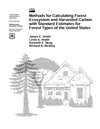Trees help reduce carbon dioxide (by sequestering carbon in plant tissues during photosynthesis), thus improving local and global environments; in addition, trees can reduce airborne particulate pollution. Forested uplands are important as a source of clean water for millions of the inhabitants of the Northeast and Midwest. For example, New York City prides itself on its pure tap water, which comes to the city from reservoirs upstate in Westchester County and the Catskill Mountains. Other cities rely on water from similar watershed systems (Boston), aquifers (East Lansing), or from natural rivers (St. Paul/Minneapolis & Washington, DC) and lakes (Chicago & Cleveland). Rural residents often rely on groundwater from their own wells. In all types of water supplies, the forest health of the surrounding lands is vital to the integrity of these water-supply systems. Rainfall that passes through forests is cleaner than rainfall that drains from roads or disturbed lands. Groundwater that has passed through forested buffers is cleaner than water running directly off farm fields.
These benefits may become limited by a loss of forest area and degradation of forest functions through various environmental changes, often occurring because of the public's lack of awareness of the importance of the "ecosystem services." Appropriate forest management improves the delivery of clean water and air that enhance the well being of people and communities in the Northeast and Midwest. NRS scientists develop land management tools to protect forests and their production of clean water and air for our growing population as well as studying the processes by which these benefits occur.
Science Topics
- Estimating and monitoring carbon stocks and greenhouse gas fluxes
- Development of technology to enhance carbon sequestration in forests
- Economic utilization of forests for bioenergy
- Methods to conserve and enhance the production of clean water from forests
- Riparian forest health
Last Modified: 10/01/2006

